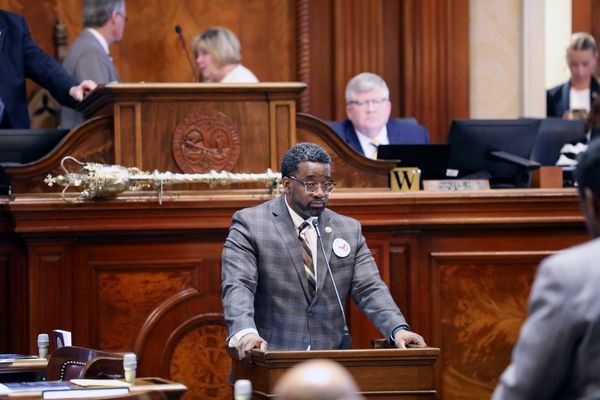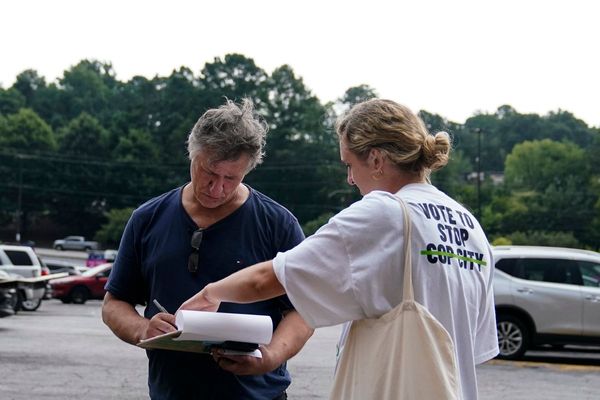
Four-year-old Joanna Gillikin likes to watch Ada Twist, Scientist, a Netflix children’s show about a young girl with a giant interest in science.
So when Matthew Gillikin and his wife, Shannon, enrolled Joanna in a trial in Charlottesville, Virginia, for the Pfizer vaccine against Covid-19, they described it to her as a science experiment, like the ones Ada does.
“Her mind was able to latch onto the fact that not only is she participating in something that could make her healthier, but also help make other people healthier,” said Matthew, a speech therapist.
Many parents across the United States are eagerly waiting to see whether Joanna and other trial participants can help them.
They are upset that more than a year after the Food and Drug Administration (FDA) authorized the vaccines for emergency use for adults, they are still not available to children under five.
Now, as the number of new Covid cases continues to fall in parts of the country and talk has returned of figuring out how to forge a ‘new normal’ after the pandemic, some parents of the young children – and their pediatricians – feel as though that population has been left behind.
They think the FDA has not acted with enough urgency to make the vaccines available, leaving young children vulnerable to the virus and unable to return to ordinary life.
“It’s just about time that we really prioritize these young children,” said Dr Alpa Shah, a pediatrician in Milwaukee. “The narrative throughout this pandemic has been, ‘Well, Covid is mild in these young kids, and the vaccine is now available to children,’ and it’s almost as if we are forgetting that there is a population of children that doesn’t have a means of protection.”
Pfizer and its German partner BioNTech have encountered setbacks in their trials for that age group. In December, the companies announced that two doses of the vaccine triggered a sufficient immune response in children six months to two-years-old, but not in kids aged two to four. As such, they said they would add a third dose for children under five.
The decision “reflects the companies’ commitment to carefully select the right dose to maximize the risk-benefit profile”, they said in a statement.
If the study is successful, the companies expect to submit data to request emergency use authorization in the first half of 2022. Dr Anthony Fauci, the White House’s chief medical adviser, said earlier this month that he hopes the FDA authorizes the vaccine for children in that age group in the coming weeks.
Moderna, which has not had its vaccine authorized in the United States for anyone under age 18, announced earlier this month that it expects to report data for children ages two to five in March and then potentially seek FDA authorization.
Shah, who has a 2-year-old daughter, said she understands that the FDA wants to ensure the vaccine is safe and doesn’t place blame on a particular group. But she thinks the government should adjust its authorization process.
Shah was among more than 250 physicians who signed an open letter posted last week urging Dr Janet Woodcock, the FDA acting commissioner, to allow “providers and parents the option of joint decision-making to immunize children with off-label use”, meaning without government approval.
The group, Protecting Their Future, also suggested that the FDA diverge from its normal age de-escalation approval process in which a vaccine is tested among the oldest age groups and then gradually tested among younger people. They would like to see the agency authorize the Pfizer vaccine for ages six months to two years because of the apparently successful results for that subgroup.
While the general population can choose which safety measures to follow, including getting vaccinated, “our children don’t have a choice”, the letter states.

CJ Koeninger, a coordinator of a children’s ministry in Madison, Wisconsin, has been especially concerned about Covid because her two daughters, Piper and Ellie, now seven and four, were both hospitalized shortly before the pandemic due to asthma exacerbation. Children with moderate to severe asthma are at a greater risk of becoming severely ill from Covid, according to the Centers for Disease Control and Prevention (CDC).
While both girls’ asthma is now well controlled, Koeninger said their hospitalization has “made all the messaging about ‘Kids are fine. It’s not a big deal for kids,’ a little bit frustrating because, well, you don’t know my kids”.
Of the more than 848,000 people who have died in the United States from Covid, 727 have been under age 18, according to the CDC. Less than 1.5% of child Covid cases have resulted in hospitalization, according to the American Academy of Pediatrics (AAP).
But the number of Covid cases has increased dramatically recently due to the Omicron variant. There were more than 1.1 million child Covid cases reported the week ending 20 January, five times the rate of the peak of the winter surge in 2021, according to the AAP. The number of people under age 18 who were hospitalized with Covid also spiked during the Omicron surge, but fell by 8.9% the week of Jan. 16, according to the CDC.
“The AAP shares your concerns about the inaccurate and harmful media narrative that Covid-19 illness is ‘mild’ in children,” Dr Sandy Chung, the AAP president elect, stated in an email to Shah. “We are in close contact with colleagues at CDC and FDA and have been urging them to prioritize the research and approval process for pediatric vaccines for nearly two years.”
Koeninger, who tried to enroll Ellie in a trial, doesn’t understand why groups could not have conducted vaccine trials for different age groups simultaneously.
“We are all just so tired,” Koeninger, 32, said of parents of young children. “It feels like the world has moved on, everyone thinks the pandemic is over, and we are still quarantining every few weeks.”
While Eric Rubin, an immunologist at Harvard University and member of the FDA advisory committee, said he is sympathetic to parents whose children aren’t yet eligible for the vaccine, he does “not want to second guess the process”.

For trials, researchers treat older people first because a potential side effect could become “more acute as you get younger and younger, so one way to make sure you put the smallest number of people at risk is to work” your way down, explained Rubin, who like other members of the advisory committee, has not seen data from the trials.
As to the request for the FDA to authorize the Pfizer vaccine just for children ages six months to two years, Rubin explained that studies are designed for a certain number of people, and subgroups are often too small to offer proof.
Dr Jay Portnoy, an advisory committee member and medical director at Children’s Mercy Hospital in Kansas City, Missouri, saw the number of children with Covid in his hospital increase during the Omicron wave and said he understands parents’ frustration. But he still said he would not endorse off-label usage of the Pfizer vaccine, as Protecting Their Future suggests.
“There is a reason why the label is the way it is, and if it becomes the wild west and everyone just starts doing things willy-nilly, there is no way we are going to be able to keep track of adverse events and how effective it is and all kinds of complications could occur that I would be worried about,” said Portnoy.
Kelly Edinger, a mother of three in Troy, Missouri, tried unsuccessfully to get her youngest daughter, Kennedi, four, into a vaccine trial and is disappointed that she hasn’t been able to get the shots. But she said she understands the delay.
“They want to make sure it’s safe, and I think I like that idea better, as long as I know they are taking the right steps,” said Edinger, who stays home and helps her children with their virtual school.
Though Gillikin was able to enroll Joanna in a trial, it hasn’t changed much for his family because they don’t know if she received three doses of the vaccine or a placebo.
Gillikin also sees the ongoing harm caused by the virus because he primarily works with adults at UVA Hospital who have swallowing problems. It’s often because they had Covid and were intubated to help them breathe.
“We have so many Covid patients right now. It’s the highest it’s been in the whole pandemic,” Gillikin said earlier this week.
Even if they learn that Joanna was vaccinated, the family’s activities will still depend in part on the prevalence of the virus, he said.
“We haven’t attended indoor church since the pandemic started, and I think that’s something we would be interested in doing again once they are vaccinated,” Gillikin said of the kids. “I would like for [Joanna] to be able to have friends over for playdates.”







